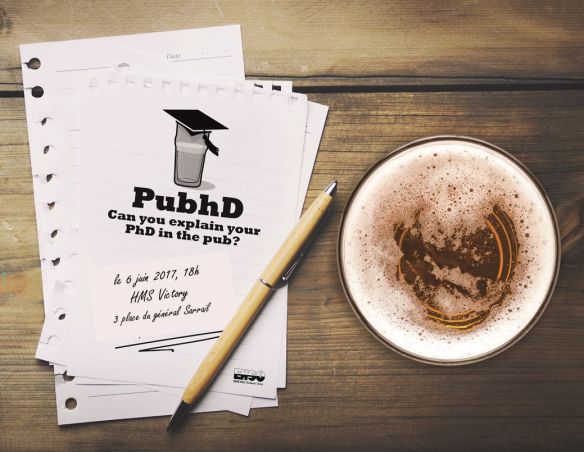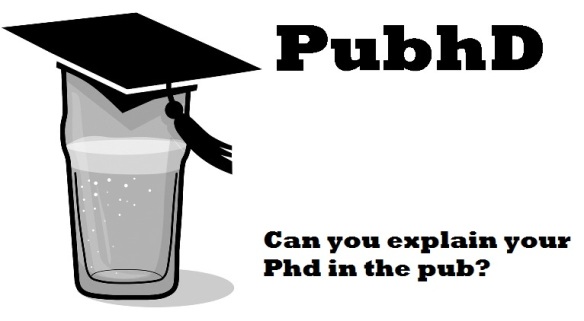A guest post from The Genome Analysis Centre (TGAC)

On Tuesday 26 January, three scientists from The Genome Analysis Centre (TGAC) helped kick-off the first instalment of ‘PubhD’ at the Cellar House in Eaton, Norwich.
A varied local audience, joined two TGAC PhD students, Thomas Bradley and Maxwell Rogers, to learn about the breadth of TGAC’s research through a series of talk. Facilitated by TGAC Public Engagement and Society Officer Peter Bickerton, the session showcased topics from fascinating fish, and the orchestra of life to the wonders of microalgae, followed by some in-depth questions, answers and dialogue.
A national campaign, PubhD aims to help PhD students explain their research to a lay audience using just a whiteboard and marker pens. The idea is to get across the main focus of their research in terms that anyone can understand before members of the public get the chance to quiz them and discuss over a drink or two.
Considering the importance that PhD research has on the bulk of published science, as well as the famous discoveries that have occurred over a pint in the pub (the structure of DNA for one), where events such as this are an extremely valuable experience.
Thomas Bradley from the Swarbreck Group at TGAC gave a fascinating talk, entitled “The crafty mechanism of life”, using impressive analogies. He had the audience imagine that genes are all part of an orchestra, each one representing a different section – be it horns, violins or percussion. In our different tissues, we have the same genes, yet each section of the orchestra plays louder or more softly; and so our brains might play Mozart while our lungs are playing Beethoven. He then explained his research in terms of the orchestra’s ‘conductor’ – microRNA – using machine learning algorithms not dissimilar to those used by the internet. His analogies resonated with the crowd, where his talk was described by one audience member as “music to my ears.”
Maxwell Rogers, from the Di Palma Group at TGAC, spoke about “Why cichlid fish are awesome” which was equally well received and gave the participants a great insight into the evolution of one of the most wonderfully diverse groups of species on the planet. He carried on with Thomas’s analogy, linking the orchestra of genes to describe how we come to a phenotype – how genes make proteins and all of the different forms that cichlid fish can take. One audience member simply said, “I want to know more,” while another commented that the talk was “really well explained and a very promising experiment, the speaker was very knowledgeable.”
Finally, Dr Peter Bickerton gave a lively talk on his PhD project entitled “Stressing algae.” Peter spoke about how green algae are a good model to better understand how animals and plants evolved, as well as some of the complex processes that arose in much more ancient life forms. He explained how algae use calcium as a signal and for a variety of other functions – even to detect light through primitive eyes. One audience member said, “It’s amazing how interesting he can make calcium and algae – not an easy job.”
The audience of thirty people left feeling both engaged and informed, describing TGAC as “worthwhile” and “very far-reaching; looking forward to all the benefits in the future.” Various people also expressed their interest in hearing more and signed-up to hear about future TGAC events.
Dr Bickerton, Public Engagement and Society Officer at TGAC, said: “The first Norwich PubhD at the Cellar House was a fantastic success, and many thanks to Victoria for conceiving and hosting the event. We managed to foster a very effective dialogue between our PhD students and the audience, inspiring the audience about the varied and important research undertaken at TGAC. We look forward to bringing more of our postgraduate students along in the near future.”
Cellar House Landlady Victoria MacDonald, said: “A great fun and inspirational evening with huge support and some lovely feedback! It was brilliant to see the science ‘coming alive’ in a social and informal setting. Looking forward to the next one.”
TGAC is strategically funded by BBSRC and operates a National Capability to promote the application of genomics and bioinformatics to advance bioscience research and innovation.
PubhD Norwich‘s next event is on Tuesday 23 February 2016 and features speakers from the Institute of Food Research.












